- Last Updated: January 15th, 2026
Key Takeaways
Nearly 95% of teenagers use social media platforms for hours each day, significantly influencing their social experiences, self-esteem, body image, and mental health.
Excessive social media engagement is linked to increased risks of depression, anxiety, loneliness, and vulnerability to cyberbullying among teenagers.
Parents, educators, and legal advocates like TruLawsuit Info play crucial roles in promoting healthy social media habits, digital literacy, and accountability from tech companies to protect teenagers' well-being online.
Overview of the Psychological Effects of Social Media on Teenagers
On this page, we’ll discuss the Psychological Effects of Social Media on Teenagers, impacts of social media on teenage mental health, additional risks associated with excessive social media use, and much more.
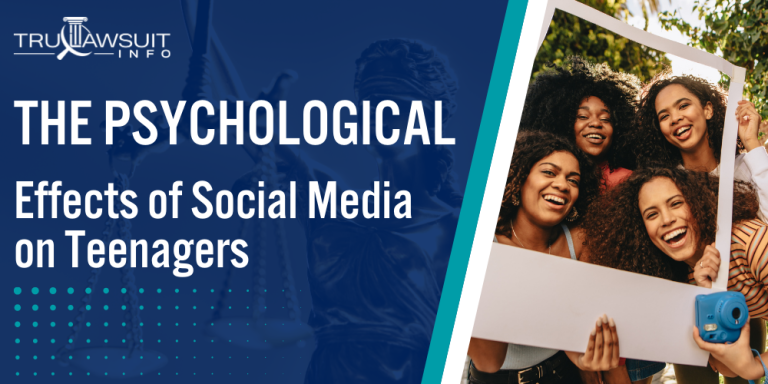
Intro to the Psychological Effects of Social Media on Teenagers
Some of the key aspects of the Psychological Effects of Social Media on Teenagers include, but are not limited to:
- Addiction: Social media can be addictive, leading to excessive use that interferes with daily life and relationships.
- Body Image Issues: Exposure to idealized images on social media can contribute to body image issues and eating disorders.
- FOMO and Anxiety: The fear of missing out (FOMO) and constant comparison to others on social media can lead to anxiety and stress.
- Cyberbullying: Teenagers are particularly vulnerable to cyberbullying on social media, which can have severe psychological consequences.
If your teenager has suffered psychological harm due to the use of social media, you may be eligible to seek compensation on their behalf.
Contact Tru Lawsuit Info using the chat on this page for an instant case evaluation to find out if you qualify to join others filing social media harm lawsuits.
Prevalence of Social Media Use Among Teenagers
Social media have significantly reshaped the landscape of adolescent communication.
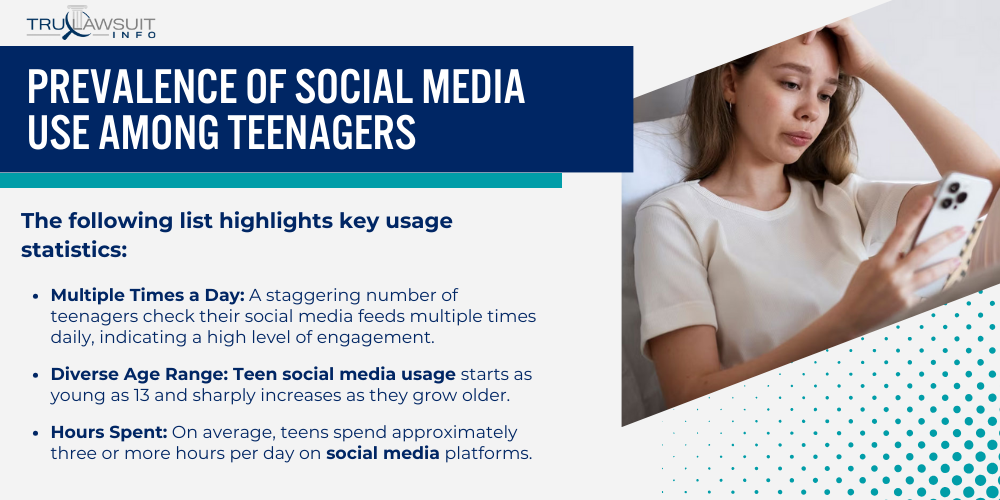
Most teenagers engage with various platforms, shaping their social experiences and interactions.
Statistics on Teen Social Media Usage
The Pew Research Center reports that nearly 95% of teenagers have access to a smartphone, with many using it as their primary gateway to social media.
The following list highlights key usage statistics:
- Multiple Times a Day: A staggering number of teenagers check their social media feeds multiple times daily, indicating a high level of engagement.
- Diverse Age Range: Teen social media usage starts as young as 13 and sharply increases as they grow older.
- Hours Spent: On average, teens spend approximately three or more hours per day on social media platforms.
- Impact on Life: Teenagers report the significant influence of social media on their daily lives, friendships, and current events awareness.
Popular Social Media Platforms Among Adolescents
Teens gravitate towards certain social media platforms for different reasons, from keeping up with friends to following their interests.
Here’s a snapshot of their preferences:
- Instagram: Highly popular for its visual content, appealing to teenagers’ desire for creative expression and connection.
- TikTok: This platform’s explosive growth is credited to its short, engaging video format that captivates the teenage audience.
- Snapchat: Known for its ephemeral content, it remains a favorite for casual, peer-to-peer communication among teenagers.
- Twitter: While not as popular as other platforms, it retains a segment of the teenage population interested in real-time updates and trending topics.
Impact of Social Media on Self-Esteem and Body Image
Social media platforms create a space where teenagers often engage in social comparison that can lead to a negative self-perception and influence their body image.
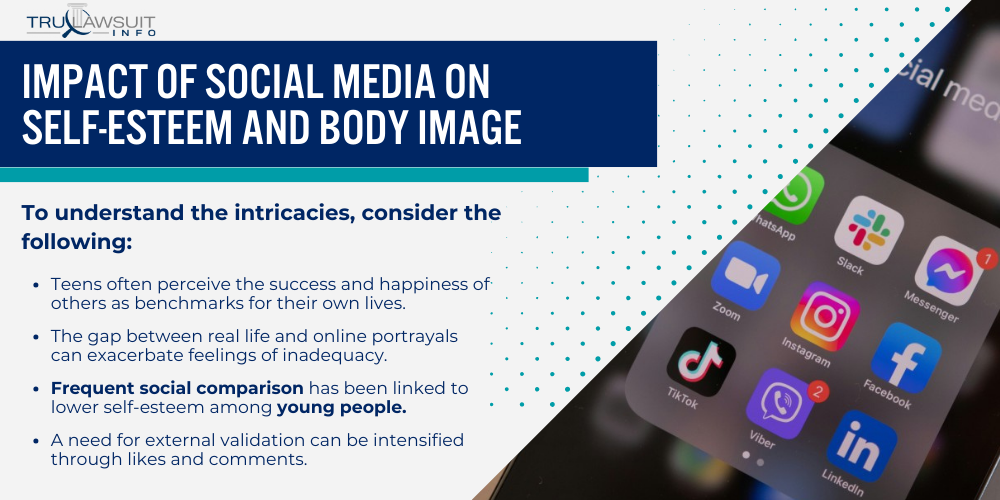
This environment may contribute to low self-esteem and, in some cases, eating disorders.
Social Comparison and Negative Self-Perception
Social media has become a breeding ground for negative social comparison.
Teens scrolling through their feeds encounter a continuous stream of peers and influencers who appear to have the perfect life, body, and experiences.
When teens measure their own lives against the carefully curated images of others, they may feel inadequate or less successful.
To understand the intricacies, consider the following:
- Teens often perceive the success and happiness of others as benchmarks for their own lives.
- The gap between real life and online portrayals can exacerbate feelings of inadequacy.
- Frequent social comparison has been linked to lower self-esteem among young people.
- A need for external validation can be intensified through likes and comments.
Filters and Edited Images on Body Dissatisfaction
The widespread use of filters and photo editing applications on social media cannot be overstated.
Their impact on body dissatisfaction among teenagers is a pressing concern.
Those perfect selfies aren’t so perfect when their impact is scrutinized.
The more time teens spend engaging with these altered images, the more likely they are to become dissatisfied with their own appearance.
Let’s break down the specifics:
- Filters create an illusion of flawless skin, reshaping faces and bodies to fit an unattainable standard.
- Edited images often lead to an unrealistic benchmark for physical appearance.
- The discrepancy between one’s own body and the idealized images can fuel body dissatisfaction.
- This dissonance may contribute to the development of unhealthy dieting or exercise behaviors as teens chase these unachievable looks.
Social Media and Mental Health Concerns in Teenagers
In exploring the psychological landscape of today’s youth, compelling evidence links social media use to an escalation in mental health challenges among teenagers.
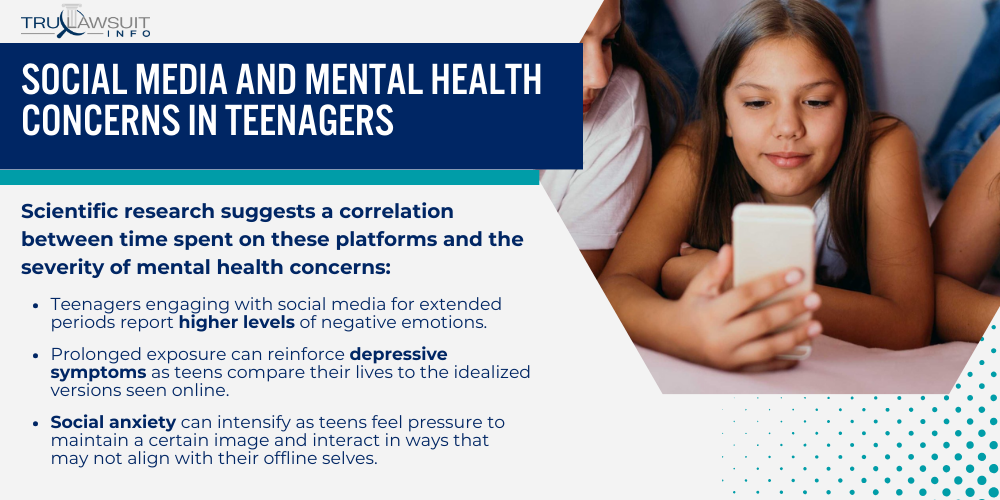
This section delves into how platforms purportedly designed for connection may conversely be fueling feelings of isolation and distress.
Increased Risk of Depression and Anxiety
Social media’s effects can significantly amplify symptoms of depression and anxiety in the teenage population.
Scientific research suggests a correlation between time spent on these platforms and the severity of mental health concerns:
- Teenagers engaging with social media for extended periods report higher levels of negative emotions.
- Prolonged exposure can reinforce depressive symptoms as teens compare their lives to the idealized versions seen online.
- Social anxiety can intensify as teens feel pressure to maintain a certain image and interact in ways that may not align with their offline selves.
- The need for social approval and fear of missing out (FOMO) contribute to teen mental health problems in vulnerable teens.
Studies highlight that adolescents who spend more than three hours per day on social media websites may be at a higher risk of developing mental health problems such as depression and anxiety.
Link Between Social Media Use and Loneliness
Recent studies highlight a troubling trend where social media, designed to enhance communication, often leads to increased loneliness among its users.
This disconnection stems from online interactions that, while frequent, lack the depth and emotional resonance of face-to-face conversations.
Contrary to its intent to connect, excessive social media use has been tied to increased feelings of loneliness:
- Algorithms fostering comparison trap teenagers in a cycle of poor mental health, feeling isolated in their experiences.
- Social media can create an illusion of connectedness while masking the decline of meaningful in-person relationships.
- Teens report feeling left out or inadequately engaging with their peers, nurturing a sense of social exclusion.
- A focus on quantity over quality of interactions may lead to superficial connections that don’t satisfy the need for real companionship.
This paradox of connectedness has been identified through varied studies as a contributing factor to mental health conditions in teenagers who primarily interact in these digital spaces.
Cyberbullying and Its Psychological Consequences
In exploring the challenges faced by teenagers on social media, two critical points stand out: the widespread occurrence of cyberbullying and the significant psychological toll it can take on young individuals.
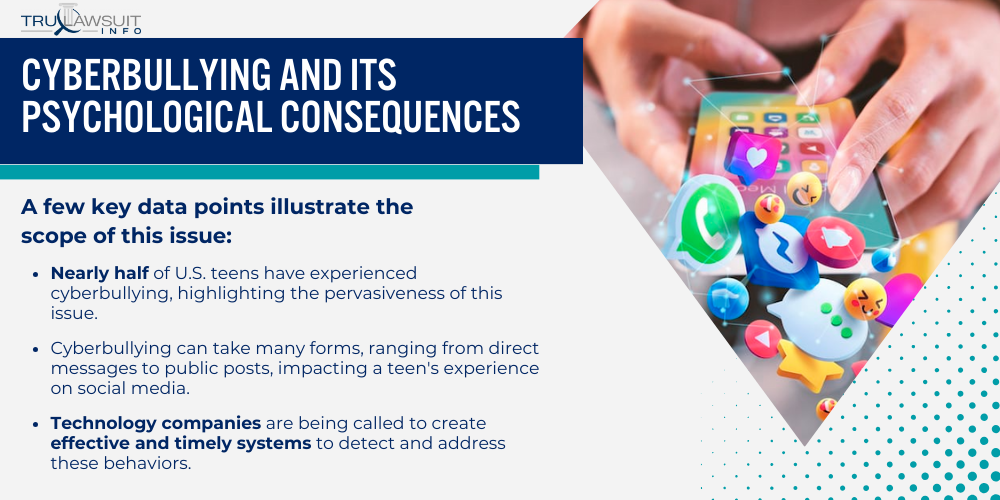
Prevalence of Cyberbullying on Social Media Platforms
Cyberbullying is an increasingly common problem on social media platforms, with adolescents facing online harassment at an alarming rate.
Online interactions can take a toxic turn as anonymity and the absence of physical activity and presence make it easier for bullies to target their peers.
A few key data points illustrate the scope of this issue:
- Nearly half of U.S. teens have experienced cyberbullying, highlighting the pervasiveness of this issue.
- Cyberbullying can take many forms, ranging from direct messages to public posts, impacting a teen’s experience on social media.
- Technology companies are being called to create effective and timely systems to detect and address these behaviors.
- Despite efforts at improving online safety, teens are still vulnerable to online abuse, indicating a need for continuous improvement.
Emotional and Mental Health Impact of Cyberbullying
The psychological impact of cyberbullying can be deep and multifaceted.
Mental health concerns are particularly salient as the emotional toll can manifest in various distressing ways:
- Teens subjected to cyberbullying report feelings of anxiety, depression, and embarrassment.
- Identifying self-harm tendencies is critical as these could be a consequence of sustained online bullying.
- Adolescents dealing with cyberbullying often show symptoms of psychological stress such as headaches or stomachaches.
- Their online behavior may change, becoming more withdrawn or secretive about their digital interactions.
Furthermore, studies suggest that the psychological effects of cyberbullying may be more intense than face-to-face bullying due to the persistent nature of digital platforms, causing lasting negative emotions and experiences.
Clearly, while social media presents numerous opportunities for connection, it is imperative that the issues surrounding cyberbullying are addressed to safeguard the well-being of teenagers.
Social Media Addiction and Its Effects on Teenage Brains
In an environment where likes, comments, and shares are the currency of validation, teenagers are particularly vulnerable to the lure of social media.
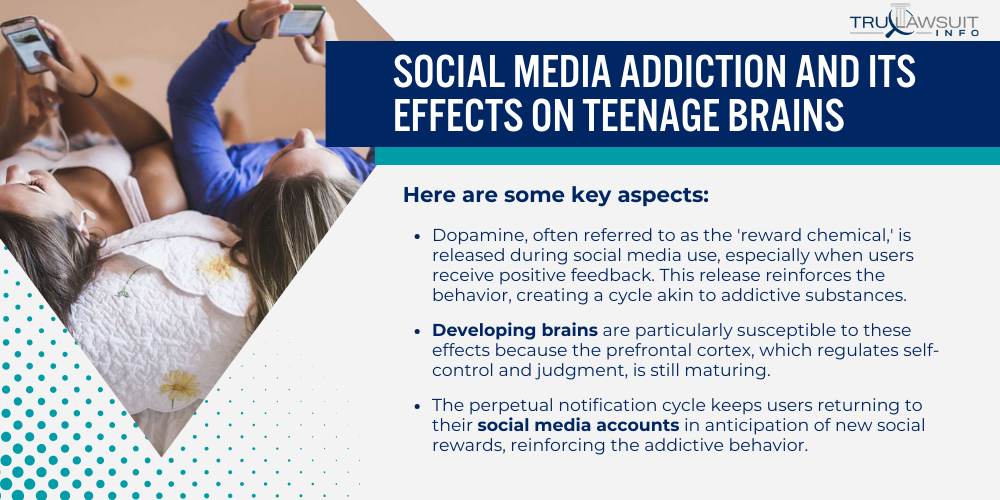
With brains still developing, the impact of such immersive and interactive platforms can be profound both neurologically and behaviorally.
Neurological Basis of Social Media Addiction
Social media addiction represents a pattern of behavior that mirrors substance dependency, with its roots deeply implanted in the neurological circuits of the teenage brain.
Here are some key aspects:
- Dopamine, often referred to as the ‘reward chemical,’ is released during social media use, especially when users receive positive feedback. This release reinforces the behavior, creating a cycle akin to addictive substances.
- Developing brains are particularly susceptible to these effects because the prefrontal cortex, which regulates self-control and judgment, is still maturing.
- Neurological responses in areas such as the ventral striatum, which heightens sensitivity to social rewards, are amplified during the teenage years. This can increase a teenager’s vulnerability to addiction.
- The perpetual notification cycle keeps users returning to their social media accounts in anticipation of new social rewards, reinforcing the addictive behavior.
Consequences of Excessive Social Media Use on Cognitive Development
Excessive use of social media can have various repercussions on teenagers’ cognitive development.
Attention to the following areas can illustrate these effects:
- Prolonged social media use can divert time and energy from activities that enhance critical social skills and support developing age-appropriate health behaviors.
- Teenagers can develop mental health conditions due to social media addiction, with potential effects on overall health outcomes, including increased anxiety and depression symptoms.
- The absence of responsible social media behavior can substantially reduce the quality of in-person social interaction and impair the development of empathy and other social cognitive skills.
- Recognizing the potential for harm, the Surgeon General’s advisory has highlighted the importance of understanding the relationship between social media use and mental health, especially concerning the safeguarding of children and adolescents.
Influence of Social Media on Teenage Relationships
Social media plays a significant role in shaping how teenagers interact with each other and form relationships.
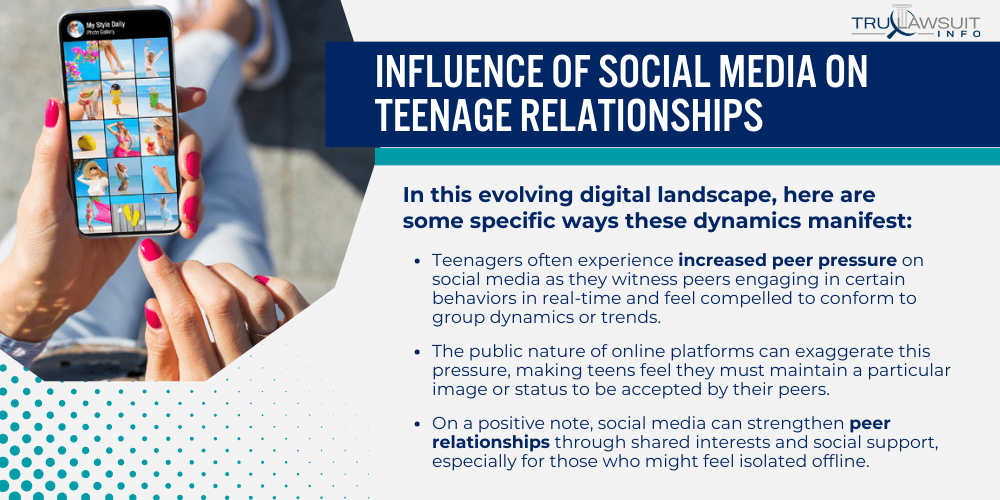
It’s not just about how often they text or message each other, but deeper trends and behaviors are influenced too.
Impact on Friendship Dynamics and Peer Pressure
Social media alters friendship dynamics by enabling new ways for teenagers to connect and share experiences.
They now have constant access to each other’s daily lives, creating novel challenges and peer influences.
In this evolving digital landscape, here are some specific ways these dynamics manifest:
- Teenagers often experience increased peer pressure on social media as they witness peers engaging in certain behaviors in real time and feel compelled to conform to group dynamics or trends.
- The public nature of online platforms can exaggerate this pressure, making teens feel they must maintain a particular image or status to be accepted by their peers.
- On a positive note, social media can strengthen peer relationships through shared interests and social support, especially for those who might feel isolated offline.
- A family media plan can guide teenagers to form healthier online behaviors and relationships while minimizing negative social media impacts.
Maintaining strong friendships might require teenagers to develop robust relationship skills and set boundaries against negative peer influences online.
Social Media in Romantic Relationships Among Teenagers
The introduction of social media adds new layers to romantic relationships among teenagers, affecting the way these relationships start, develop, and sometimes end.
Here are several significant impacts social media has on these relationships:
- Social media can influence teens’ unrealistic expectations of what a healthy relationship should look like, as they consume a flood of images and stories every day.
- Constant connectivity can lead to challenges such as jealousy and misunderstanding, as the context of interactions is not always clear online.
- They provide a social media account for social support but can also expose teens to the risks of oversharing personal feelings or experiencing cyberbullying within romantic contexts.
- Teens must learn to navigate the balance between online interactions and face-to-face communication in their romantic relationships.
By understanding these influences, teenagers can better manage their social interactions and support each other through the growing pains of building relationships in the digital age.
Strategies for Promoting Healthy Social Media Use Among Teenagers
Promoting healthy social media use is essential in safeguarding the mental health condition of teenagers.
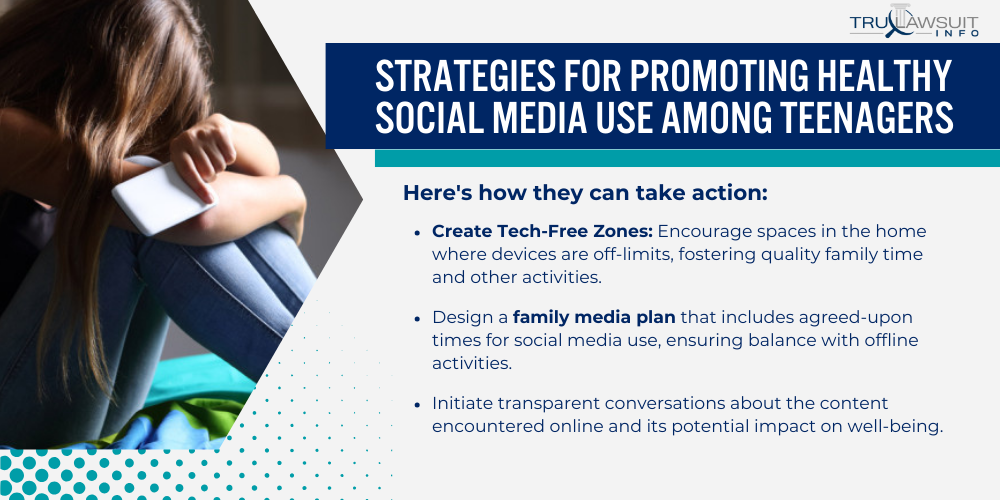
This section offers practical approaches for creating a balanced digital environment.
Parental Involvement and Monitoring
Parents play a pivotal role in guiding their teenagers towards healthy social media habits.
Here’s how they can take action:
- Create Tech-Free Zones: Encourage spaces in the home where devices are off-limits, fostering quality family time and other activities.
- Design a family media plan that includes agreed-upon times for social media use, ensuring balance with offline activities.
- Initiate transparent conversations about the content encountered online and its potential impact on well-being.
- Support independent assessments of a teen’s social media use to understand its effect and make informed decisions about limits and usage patterns.
Educational Programs on Digital Literacy and Responsible Social Media Use
Equipping teenagers with the skills to navigate the online world safely is crucial.
Here’s what can be done:
- Implement school-based programs that focus on digital literacy, teaching students to discern reliable information from misleading content.
- Promote critical thinking about social media platforms’ algorithms and design features that may affect adolescent health.
- Advocate for increased funding in education to develop comprehensive programs that cater to the nuances of digital well-being.
- Urge educators to provide practical steps for students to manage their online presence and the pressure always to be connected.
Potential Benefits of Social Media for Teenagers
Social media offers various positive impacts for the younger generation, from fostering social connections to encouraging creative expression and enhancing skill development.
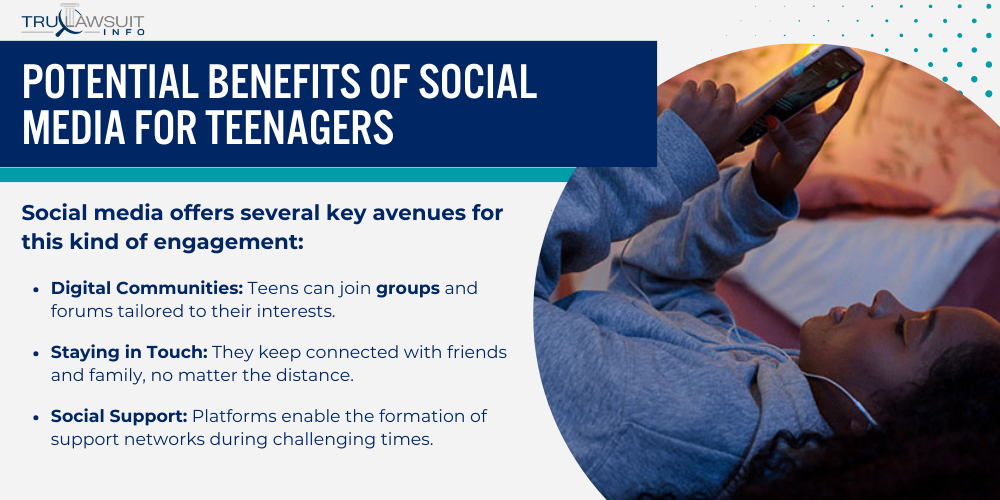
Opportunities for Social Connection and Support
Social media sites provide teenagers with a digital space to maintain relationships and build new ones.
These platforms act as crucial touchpoints to share experiences, seek advice, and find emotional support from peers.
Social media offers several key avenues for this kind of engagement:
- Digital Communities: Teens can join groups and forums tailored to their interests.
- Staying in Touch: They keep connected with friends and family, no matter the distance.
- Social Support: Platforms enable the formation of support networks during challenging times.
- Well-being: Positive interactions online can contribute to a teenager’s sense of well-being.
Platforms for Creative Expression and Skill Development
Teenagers often use social networking sites as outlets for self-expression and as a means to learn and hone new skills.
Here are some of the key benefits that social media offers in these areas:
- Showcasing Talents: Many teens share their artistic, musical, or writing talents online.
- Learning Opportunities: Educational content is widely available and easily accessible.
- Feedback and Growth: Constructive criticism and discussion can help foster personal development.
- Global Exposure: Social media provides a stage for talents to be recognized on a global scale.
By engaging with these platforms, teenagers are not just consumers of content but active participants in a digitally interconnected world.
TruLawsuit Info: #1 Social Media Lawyer
In the landscape of legal battles against tech companies, TruLawsuit Info stands out as a leading firm focusing on the effects of social media on teenagers.
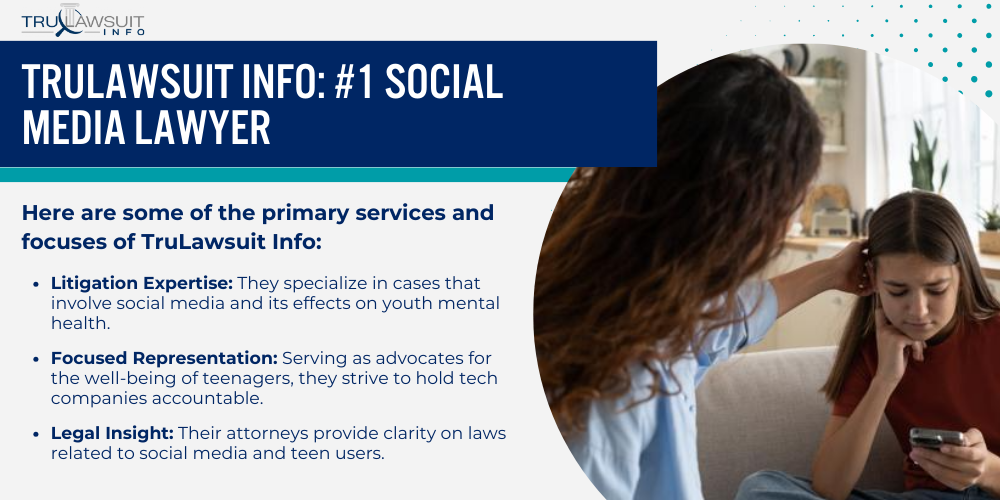
They advocate for transparent and independent assessments of the psychological impacts these platforms may have.
Here are some of the primary services and focuses of TruLawsuit Info:
- Litigation Expertise: They specialize in cases that involve social media and its effects on youth mental health.
- Focused Representation: Serving as advocates for the well-being of teenagers, they strive to hold tech companies accountable.
- Legal Insight: Their attorneys provide clarity on laws related to social media and teen users.
- Resource Hub: TruLawsuit Info is known for sharing valuable information to assist families affected by social media’s potential harm.
Their approach is based on a confident belief that users, particularly the younger demographic, deserve protection against any negative experiences induced by algorithms tailored to grasp and keep their attention.
The team is knowledgeable about how these platforms work and the ways they can impact a young person’s mental health.
In addition to legal representation, TruLawsuit Info is committed to educating families on the risks associated with social media use.
They firmly support the need for more oversight of tech companies to ensure a safer online environment for all users, especially adolescents who are at a developmental stage where they are more vulnerable to psychological harm.
Frequently Asked Questions
-
Social media provides a platform for teenagers to connect with peers and express themselves creatively.
Conversely, it can also lead to cyberbullying, social isolation, and the development of unrealistic expectations about life and personal image.
-
Regular use of social media has been associated with alterations in teenagers’ mental health.
Studies indicate that it can both support their development by fostering connections and contribute to stress and sleep disruption.
-
Evidence suggests a correlation between heavy social media usage and an increase in depressive symptoms among teenagers.
The exact nature of this relationship continues to be a topic of much research, suggesting a complex interplay between online behavior and mood Social media harms teens’ mental health, mounting evidence shows.
-
Social media may lead to anxiety through constant social comparison and fear of missing out (FOMO).
The pressure to maintain a particular image and the exposure to a large volume of negative news can also heighten feelings of anxiety.
-
Teenagers may experience shifts in self-esteem, social perception, and emotional regulation due to their interaction with social media.
The immediate feedback loop from online interactions can affect their self-worth and peer relationships.
-
Research indicates that social media use is related to both beneficial and harmful outcomes for teenage mental health.
It’s linked with greater empathy and social support, as well as increased risks for depression, anxiety, and loneliness Psychology can help protect teens on social media.

Attorney Jessie Paluch, founder of TruLawsuit Info, has over 25 years of experience as a personal injury and mass tort attorney, and previously worked as an international tax attorney at Deloitte. Jessie collaborates with attorneys nationwide — enabling her to share reliable, up-to-date legal information with our readers.
Legally Reviewed
This article has been written and reviewed for legal accuracy and clarity by the team of writers and legal experts at TruLawsuit Info and is as accurate as possible. This content should not be taken as legal advice from an attorney. If you would like to learn more about our owner and experienced injury lawyer, Jessie Paluch, you can do so here.
Fact-Checked
TruLawsuit Info does everything possible to make sure the information in this article is up to date and accurate. If you need specific legal advice about your case, contact our team by using the chat on the bottom of this page. This article should not be taken as advice from an attorney.
You can learn more about the Social Media Harm Lawsuit by visiting any of our pages listed below:
Here, at Tru Lawsuit Info, we’re committed to helping victims get the justice they deserve.
To do this, we actively work to connect them with attorneys who are experts in litigating cases similar to theirs.
Table of Contents
Tru Lawsuit Info is a reliable source of information about issues that may affect your health and safety, such as faulty products, data breaches, and environmental hazards.
Our team of experienced writers collaborates with medical professionals, lawyers, and advocates to produce informative articles, guides, and other resources that raise awareness of these topics.
Our thorough research provides consumers with access to reliable information and updates on lawsuits happening around the country. We also can connect consumers with attorneys if they need assistance.
Here, at Tru Lawsuit Info, we’re committed to helping victims get the justice they deserve.
To do this, we actively work to connect them with attorneys who are experts in litigating cases similar to theirs.
